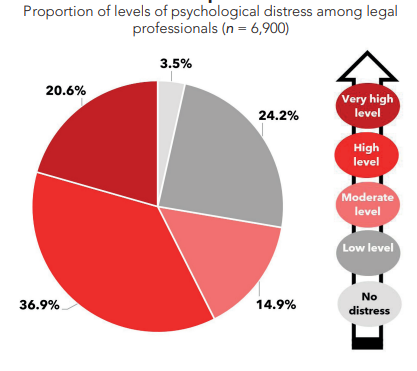
University of Sherbrooke study shows high levels of distress and burnout

Legal professionals in all areas of practice in all jurisdictions suffer from “significantly high levels of psychological distress, depression, anxiety, burnout and suicidal ideation” says research conducted at the Sherbrooke University in Quebec.
As the first comprehensive national study of its kind in Canada, the The National Study on the Psychological Health Determinants of Legal Professionals in Canada paints an alarming picture of the wellness of Canadian legal professionals.
“We should all be concerned by this data said Steeves Bujold, President of the Canadian Bar Association, in particular “the impact on women, young lawyers, lawyers with disabilities, Indigenous lawyers and other racialized legal professionals.”
The study’s key findings include:

The data analyzed in the report comes from a national survey on the wellness of legal professionals in Canada. More than 7,300 legal professionals from all jurisdictions - lawyers, Quebec notaries, Ontario paralegals and articling students - participated in the survey.
Among the groups with the highest proportions of psychological distress were:
The CBA’s Bujold noted that as a member of the LGBTQ2S+ community, he is “extremely saddened by the high rates of stress, anxiety, burnout and depression experienced by this community.”
National Study on the Psychological Health Determinants of Legal Professionals in Canada
Natalie Cadieux, associate professor and principal researcher with the Sherbrooke University’s Business School, led the study, which was financed by Federation of Law Societies of Canada and the Canadian Bar Association. She said the study “fills a critical gap” in the knowledge about the mental health of legal professionals.
"Without rigorous measurement of health issues, and of the stressors that cause them, we will be unable to take sustainable action to support the health of legal professionals. I am proud to say that by mobilizing the Canadian legal community and my team, we have taken this first step together".
“The report is a wake-up call for the profession and the regulators,” said Nicolas Plourde, President of the Federation of Law Societies of Canada. The findings are extremely troubling, he adds, “but the study provides us with information we need for all the stakeholders – employers, regulators and legal professionals themselves - to make evidence-based decisions about policies and practices that will help.”
The CBA’s Bujold added the data in the report “sheds a bright light on the heavy toll that our daily work takes on legal professionals.” And as a member of the LGBTQ2S+ community, Bujold said he is “extremely saddened by the high rates of stress, anxiety, burnout and depression experienced by this community.”
The Sherbrooke University research team will be providing recommendations later this fall on specific actions that can be taken to support wellness of legal professionals in Canada. They will also be starting on Phase II of the study, which will involve qualitative interviews with legal professionals to explore differences by province and territory. Phase II is expected to conclude in 2024.